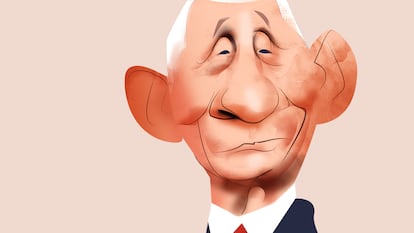Anthony Fauci, coronavirus pandemic hero and Republican foe
The esteemed epidemiologist, who has served under seven US presidents, is stepping down from his post to cheers from the scientific community and jeers from right-wing politicians


No one in the international scientific community has a bad word to say about Dr. Anthony Fauci, the Chief Medical Advisor to the President of United States. Fauci intends to step down from government service in December after announcing in August that he would be resigning, but not retiring. The epidemiologist has acted as an advisor to every US president since Ronald Reagan. Born in Brooklyn, New York, 81 years ago, Fauci worked to strengthen the public health sector in a country that disparages such efforts as either government intrusion or neglect, depending on your ideology. During the pandemic, Fauci became a favorite target of Republicans and an odd assortment of characters like Elon Musk, a man caught between a rock and a hard place in his own ideologically polarized country.
Republicans tend to decry federal intervention even during crises like the Covid-19 pandemic, which has claimed more than a million lives in the United States. The restrictions imposed during the pandemic prompted many Republican complaints, and were often discredited by then-President Donald Trump. But no one has gone as far as Musk, who faced a backlash after tweeting in mid-December that his pronouns are “Prosecute/Fauci.” With one tweet, Musk not only attacked Fauci but also mocked the widespread use of nonbinary pronouns in online profiles. White House press secretary Karine Jean-Pierre jumped in with: “They [Musk’s tweets] are disgusting and they are divorced from reality. And we will continue to call that out.”
Musk’s wearisome penchant for controversy failed to drown out Fauci’s farewell interview on CNN and his emotional biographical account in The New York Times. Fauci’s restraint stood in stark contrast to Musk’s childish outburst. “I don’t pay any attention to him because that’s merely a distraction,” said Fauci. ”And if you get drawn into that and, I have to be honest, that cesspool of interaction… there’s no value added to that… it doesn’t help anything.”
Fauci often defended himself with similar cool detachment from the verbal assaults of Trump, who once called him an idiot and threatened to fire him.
Epidemiologist Hugo Pizzi said: “Anthony Fauci had no problem confronting powerful government officials at just the right time. He provided knowledge that was useful for the US and for the whole world.” Professor Michael Sparer, director of Columbia University’s School of Public Health in New York, told EL PAÍS: “He has worked for presidents across the political spectrum providing evidence-based leadership, wisdom and scientific knowledge. Fauci is a true icon in the field of public health. Indeed, it’s hard to imagine the public health community without his thoughtful and pragmatic leadership.”
Fauci was already a battle-hardened veteran when the coronavirus pandemic hit. As the head of the National Institute of Allergy and Infectious Diseases since 1984, Fauci led the response to successive public health crises: AIDS, avian flu, Ebola, Zika and then coronavirus. While his unmatched experience enabled him to fend off attempts to politicize his role, he still regularly receives death threats.
President Biden often praises the 24/7 availability of his chief medical advisor. Fauci’s dedication to his work may explain why he didn’t wed until he was 44, a marriage that produced three daughters. A fan of long-distance running with several marathons under his belt, his infection-containment measures made him a hero to some and a villain to others. But no one can deny that the pandemic turned Fauci into a celebrity among career civil servants who are usually accustomed to invisible, unsung roles.
Three attributes helped Fauci become the pre-eminent public health leader in the United States: scientific excellence, his integrity as a civil servant, and his skillful management of major public health crises. Although the US failed to contain the spread of covid, Fauci’s leadership propelled his country to the forefront of vaccine research and development, and the subsequent immunization campaign. Fauci says he waited to step down from his current role until the pandemic could be managed as a new but stable reality.
Fauci will turn 82 on Christmas Eve. When he announced in August that he was stepping down to embark upon a new chapter, many wondered what that might look like. People close to him say that he might collaborate with an as-yet unannounced Congressional commission on the management of the pandemic, similar to the 9/11 commission. Or he might spend a lot of time defending his track record before the Republican-led inquiries that many newly elected legislators threatened during their recent campaigns.
Sign up for our weekly newsletter to get more English-language news coverage from EL PAÍS USA Edition
Tu suscripción se está usando en otro dispositivo
¿Quieres añadir otro usuario a tu suscripción?
Si continúas leyendo en este dispositivo, no se podrá leer en el otro.
FlechaTu suscripción se está usando en otro dispositivo y solo puedes acceder a EL PAÍS desde un dispositivo a la vez.
Si quieres compartir tu cuenta, cambia tu suscripción a la modalidad Premium, así podrás añadir otro usuario. Cada uno accederá con su propia cuenta de email, lo que os permitirá personalizar vuestra experiencia en EL PAÍS.
¿Tienes una suscripción de empresa? Accede aquí para contratar más cuentas.
En el caso de no saber quién está usando tu cuenta, te recomendamos cambiar tu contraseña aquí.
Si decides continuar compartiendo tu cuenta, este mensaje se mostrará en tu dispositivo y en el de la otra persona que está usando tu cuenta de forma indefinida, afectando a tu experiencia de lectura. Puedes consultar aquí los términos y condiciones de la suscripción digital.








































